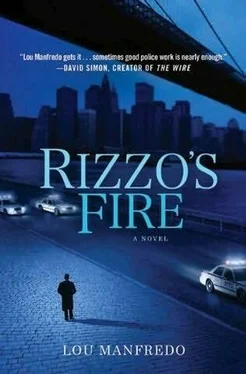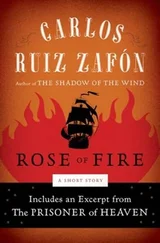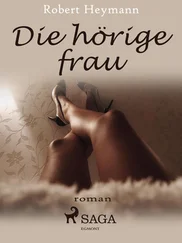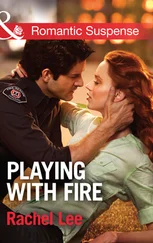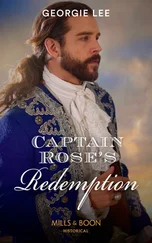“The what?”
“Poor man’s patent,” she repeated. “See, you take a copy of your work, mail it to yourself certified mail, return receipt requested. Then, when the post office delivers it, you never open the package. If it ever should become an issue, you put it before a judge with the dated receipt, and he opens it with everybody’s lawyers present. Then they have a copy to compare to the published work you figure somebody stole from you. It’s not perfect, but it’s better than nothing.”
“Yeah, I guess,” Rizzo said, “but we didn’t find anything like that in Lauria’s place or in his cousin’s garage.”
She nodded. “Yeah, well, if there was a sealed package somewhere in Lauria’s apartment and the person who whacked him was in the business, he’d have known enough to take it.”
“I figure if Lauria had a package like that, he’da put it in the garage and we’da found it,” Rizzo said.
“Or locked it up in some safe-deposit box somewhere,” she said.
Rizzo continued to rummage through the Lauria material, pulling papers free from the pile on his desk and scanning them. “Well,” he said, “we ran all his banking and finances. There is no safe-deposit box.”
“Figures,” she said. “Guy probably never even heard of the poor man’s patent thing. Only reason I did was ’cause I was hooked up with a lawyer.”
Rizzo dropped the financial reports, again picking up the rejection letters. “First thing tomorrow, we call these three agencies. Better still, we go up to their offices. These letters are all signed. We’ll talk to the signers, see if we can develop a link between any of them and Mallard or anybody associated with him.”
She nodded. “Okay, Joe, so what’s on for today?”
“Well,” he answered, “first, we spend an hour or two on the phones working our other cases. They’re getting backed up. Then we have two appointments in the city.”
“We do?” she asked.
“Yeah. On my RDO, I made a couple a calls. We’re gonna meet Mallard’s last girlfriend today. First, though, we’re goin’ to see the director of the play. I got him on the line Friday. It’s all set up.”
“Okay,” Priscilla said. “I’ll get started on the prescription case and that auto vandalism thing on Ovington Avenue. Call me when it’s time to roll.”
NEW YORK’S August Wilson Theatre was located on West Fifty-second Street between Broadway and Eighth Avenue. Rizzo and Jackson sat comfortably in two leather chairs before the small desk of the director’s office.
Larry Thurbill, forty years old, had parlayed several successful off-Broadway musical productions into an opportunity to pursue his first love, legitimate dramatic theater. Now he was the overseer of Avery Mallard’s final work, An Atlanta Landscape. Thurbill smiled across his desk at the two detectives.
“How is the coffee?” he asked.
“Great,” Rizzo said over the rim of his cup. “Coffee always tastes better when it’s served in really good china.”
“One of the perks of a big hit show,” the director said. “Believe me, I’ve had my share of coffee in cardboard.”
Rizzo placed his cup down onto its saucer, then pulled the notepad from his jacket.
“Well, Mr. Thurbill,” he said, “it was good of you to see us, we’ll try not to take up too much time.”
Thurbill waved a hand. “Take all the time you need, Sergeant, the matinee begins at three, run-through at twelve. I have tons of time. And please, call me Larry.”
“Okay, Larry,” Rizzo said clicking his Parker. “I’m Joe, this is Priscilla.”
Rizzo began a slow, informal questioning, subtly reinforcing the deliberately misleading impression he had given the director, that he and Priscilla were merely revisiting the Mallard murder. They had identified themselves only as NYPD detectives, without mentioning precinct, allowing Thurbill to make assumptions.
After nearly a half hour, Rizzo moved more toward the ground he had come to tread. Thurbill, relaxed and comfortable with the two amicable cops, answered readily.
“So, the producer,” Rizzo asked. “What’s his name again?”
“Bradley,” Thurbill said. “Thomas Bradley. He heads the group of investors who backed the play, so, technically, he’s the producer. But they all claim a bit of that role. Rightfully, I might add.”
“Yeah,” Rizzo said, “there ain’t no art without the cash, I guess.”
“Succinctly and quite accurately put, Joe,” Thurbill said.
Rizzo continued. “I don’t know very much about this kinda stuff, Larry, but I think I read somewhere that directors and producers butt heads a lot on these kinda things. You know, plays, movies, television.”
Thurbill nodded. “Yes, we do. I’m afraid our motivations are often at odds-a director’s quality and integrity of product versus a producer’s concern for commercial viability. It does become difficult at times.”
“I’ll bet. How ’bout here, with Atlanta ?” Rizzo asked. “Any problems between you and Bradley?”
Priscilla leaned forward. “My partner gets nosy sometimes, Larry,” she said.
“No, no, not at all,” Thurbill said. “I’m sure it’s one of the perks of your job. Obtaining inside info on a variety of professions and fields. Actually, to answer your question, there was a problem or two, but, of course, Avery was alive then and very much involved in preproduction, particularly with casting and story arc. Plays are not like movies, Joe. Hemingway once said the best way to sell your book to Hollywood was to go to the California-Nevada border, have them toss you the money, then toss them your novel. With a play, on the other hand, the author is very much involved, has quite a say. It is, after all, his vision which brings us all here.”
“Yeah,” Rizzo said, “I can see that. So, you had a little problem with Bradley, and Mallard straightened it out?”
“Not exactly,” Thurbill said. “Thomas Bradley is quite easy to work with actually, from a director’s point of view. In fact, we sort of reversed traditional roles a bit in one particular instance. It was more a… I don’t know, let’s say a situation, between Thomas and Avery. Thomas seemed to be pushing a bit, in my opinion. Overstepping his bounds, I think. He was adamant about the love triangle being written out of the play, and he pressed Avery right up to the actual start of rehearsals last year. It was interesting to watch the interplay. They seemed more coauthors than author-producer. Of course, in the end Avery prevailed, as he should have.”
“So you figure the love angle added to the play? Artistically?” Rizzo asked.
Thurbill smiled, leaning forward in his seat, speaking in an exaggerated tone of conspiracy.
“Ah, Joe,” he said, his eyes twinkling. “I never actually said that, now did I? No, the love angle’s merely fluff. To help fill seats. It’s a time-honored tradition in theater. Shakespeare himself inserted one or two superfluous scenes into his works. Some risqué lines and what passed as sexuality in those days. To fill the pit, you see, the area in front of the stage where the proletariat class would stand to view the production. It was good business then and remains so today.
“Avery was hungry for a hit, and, frankly, so was I. Circumstances have delivered a successful run of musicals to me.” He smiled more broadly, fluttering his hands in parody of an excited, stereotypical gay male.
“Keeping me in character, you see,” he said cheerfully. Then he grew somber. “But my goal has always been serious direction. I require meaningful works to direct. An Atlanta Landscape is meaningful. Maybe Pulitzer caliber. No, if Avery’s little sexual triangle would get the play seen, get it some attention, that was fine with me. I encouraged Avery, and so, yes, I did bump heads with Thomas a bit. But by that point, I was pretty well entrenched, I enjoyed Avery’s full support as director. I wasn’t afraid of Thomas’s firing me. So”-he shrugged-“I could afford to make a noble gesture and give my support to Avery and his agent. The love affairs remained.”
Читать дальше
